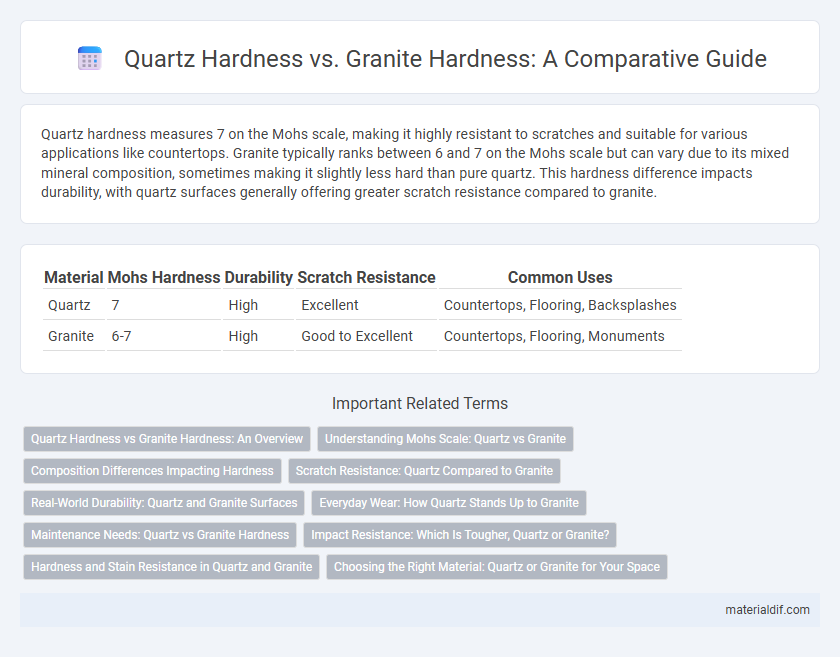Quartz hardness measures 7 on the Mohs scale, making it highly resistant to scratches and suitable for various applications like countertops. Granite typically ranks between 6 and 7 on the Mohs scale but can vary due to its mixed mineral composition, sometimes making it slightly less hard than pure quartz. This hardness difference impacts durability, with quartz surfaces generally offering greater scratch resistance compared to granite.
Table of Comparison
| Material | Mohs Hardness | Durability | Scratch Resistance | Common Uses |
|---|---|---|---|---|
| Quartz | 7 | High | Excellent | Countertops, Flooring, Backsplashes |
| Granite | 6-7 | High | Good to Excellent | Countertops, Flooring, Monuments |
Quartz Hardness vs Granite Hardness: An Overview
Quartz hardness measures 7 on the Mohs scale, making it highly resistant to scratches and abrasions, while granite, a composite material primarily composed of quartz, feldspar, and mica, averages around 6 to 7 on the same scale. The durability of quartz in comparison to granite is largely influenced by its consistent crystalline structure, providing superior resistance to surface damage. This inherent hardness makes quartz surfaces especially suitable for high-traffic areas and demanding applications where resilience is critical.
Understanding Mohs Scale: Quartz vs Granite
Quartz ranks at 7 on the Mohs hardness scale, indicating its strong resistance to scratching, while granite varies between 6 and 7 depending on its mineral composition. This means quartz generally offers superior durability for surfaces exposed to frequent wear and tear. Understanding these hardness levels aids in selecting appropriate materials for countertops, flooring, and construction applications where scratch resistance is critical.
Composition Differences Impacting Hardness
Quartz exhibits a hardness of 7 on the Mohs scale, primarily due to its uniform silicon dioxide composition, which creates strong covalent bonds. Granite, composed of quartz, feldspar, and mica, typically ranges from 6 to 7 in hardness, with feldspar's lower bond strength slightly reducing overall hardness. The distinct mineral composition variations in granite lead to less uniform hardness compared to the consistent crystalline structure of pure quartz.
Scratch Resistance: Quartz Compared to Granite
Quartz exhibits superior scratch resistance compared to granite due to its engineered composition, often ranking around 7 on the Mohs hardness scale, whereas granite typically ranges between 6 and 7. The high quartz content in engineered surfaces enhances durability, making quartz less prone to surface abrasions from daily kitchen activities. This scratch resistance advantage contributes significantly to quartz's popularity in high-traffic countertop applications, providing lasting aesthetic and functional benefits.
Real-World Durability: Quartz and Granite Surfaces
Quartz surfaces typically rank 7 on the Mohs hardness scale, while granite scores between 6 and 7, making quartz slightly harder and more resistant to everyday wear. This superior hardness translates into greater scratch resistance, which is crucial for kitchen countertops subjected to regular cutting and heavy use. Granite, however, offers excellent heat resistance and natural fracture toughness, contributing to its long-lasting durability in various real-world applications.
Everyday Wear: How Quartz Stands Up to Granite
Quartz scores 7 on the Mohs hardness scale, making it highly resistant to scratches and chips in everyday use, whereas granite varies between 6 and 7, offering solid durability but slightly less resistance. In kitchen and bathroom surfaces, quartz's engineered composition provides consistent hardness and better resistance to staining compared to natural granite. This makes quartz an ideal choice for high-traffic areas where durability against daily wear and tear is essential.
Maintenance Needs: Quartz vs Granite Hardness
Quartz hardness typically measures around 7 on the Mohs scale, making it slightly less hard than granite, which ranges from 6 to 7 depending on its mineral composition. Despite this close hardness range, quartz surfaces require less maintenance because they are engineered to resist scratches, stains, and bacterial growth better than natural granite. Granite, being more porous, demands regular sealing to maintain its durability and resistance to damage over time.
Impact Resistance: Which Is Tougher, Quartz or Granite?
Quartz exhibits higher impact resistance compared to granite due to its engineered composition, which integrates crushed quartz with resin binders, enhancing its toughness and durability. Granite, while naturally hard with a Mohs hardness rating usually around 6-7, tends to be more brittle and prone to chipping upon heavy impact. The superior toughness of quartz surfaces makes them a preferred choice in high-traffic kitchens where impact resistance is crucial for maintaining surface integrity.
Hardness and Stain Resistance in Quartz and Granite
Quartz ranks 7 on the Mohs hardness scale, making it highly resistant to scratches, while granite typically measures between 6 and 7, offering strong durability but slightly less scratch resistance. Quartz's non-porous surface provides superior stain resistance and minimizes the risk of bacteria buildup compared to granite, which is naturally porous and requires regular sealing to prevent staining. These properties make quartz a preferred choice for homeowners seeking low-maintenance, durable countertops with effective stain protection.
Choosing the Right Material: Quartz or Granite for Your Space
Quartz has a hardness rating of 7 on the Mohs scale, making it highly resistant to scratches and suitable for high-traffic areas in kitchens and bathrooms. Granite, with a hardness ranging from 6 to 7, offers excellent durability but may require more maintenance to prevent staining and chipping. Choosing between quartz and granite depends on your specific needs for durability, maintenance, and aesthetic preference, ensuring your space combines functionality with long-lasting beauty.
Quartz Hardness vs Granite Hardness Infographic

 materialdif.com
materialdif.com